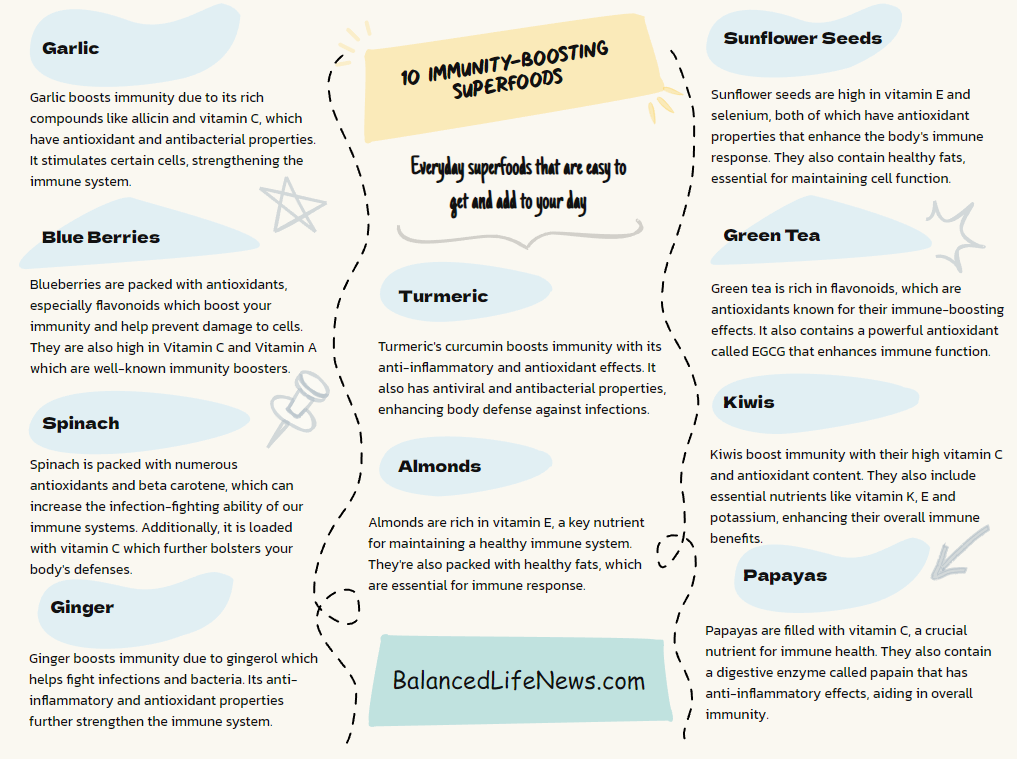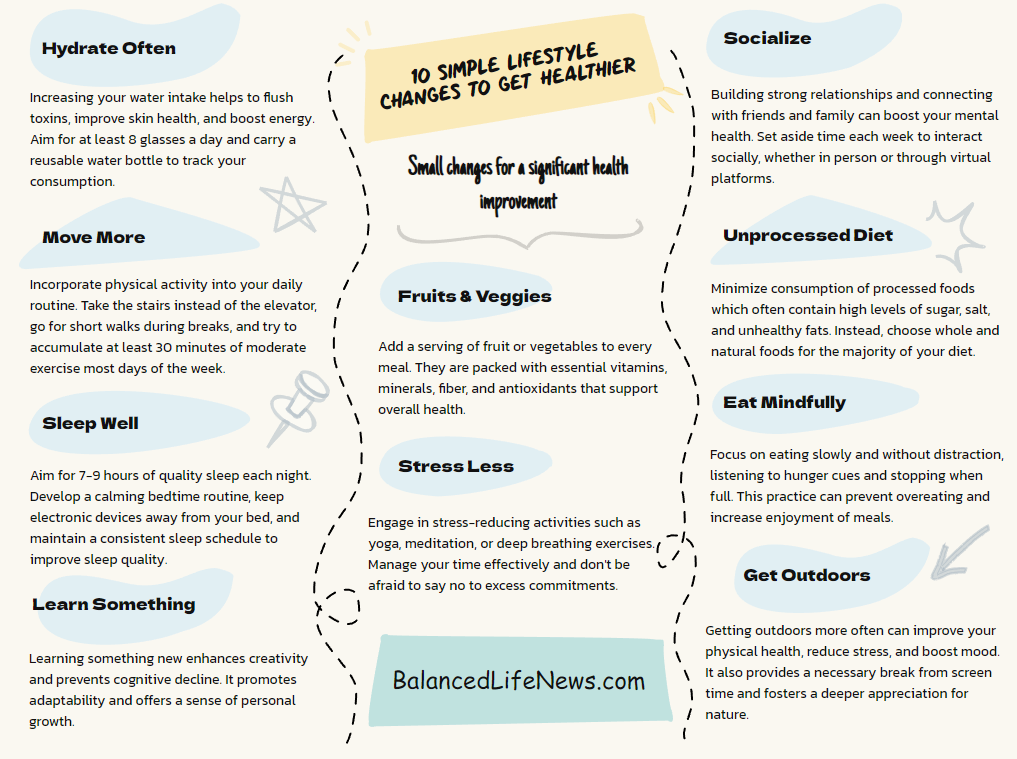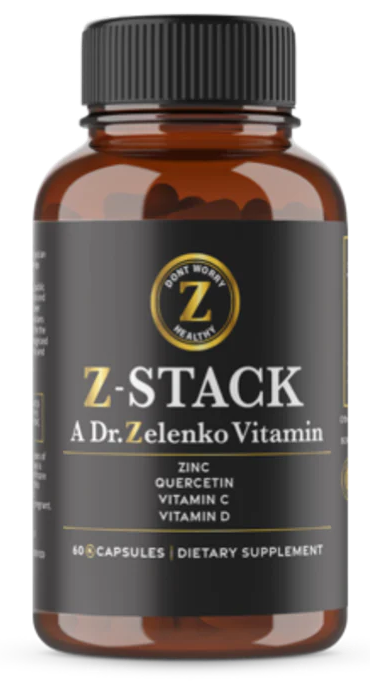Health
Supercharge Your Health: 10 Immunity-Boosting Superfoods

Supercharge Your Health: 10 Immunity-Boosting Superfoods
Embarking on a journey to amplify your body’s defenses through nutrition opens up a vibrant world of health and vitality. The cornerstone of this quest lies in superfoods, nature’s very own immune system warriors.
Listen to the Article Summary
Let’s take a look at each of the ten superfoods below to reveal their unique contributions to fortifying your body against the onslaught of pathogens.
Superfood Definition: A “superfood” is a nutrient-rich food that is especially beneficial for health and well-being. Superfoods are typically high in antioxidants, vitamins, and minerals and can offer various health benefits when incorporated into a balanced diet. Note that “superfood” is more of a marketing than a scientific term, as there is no set criterion for what makes a food “super.”
The following ten superfoods can help boost your immune system.
Garlic: The Culinary Warrior Against Infections
Garlic is a flavor enhancer in dishes and a formidable foe against infections. Its secret weapon, allicin, springs into action upon encountering viruses, rallying the white blood cells to fight off common ailments like the flu. Incorporating garlic into your diet is more than a culinary choice; it’s a strategic health decision.
Examples of how garlic can be used as a formidable foe against infections:
1. Garlic-infused chicken soup: Adding minced garlic to a homemade chicken soup can enhance the flavor and boost the immune system, helping fight off infections like the common cold.
2. Roasted garlic spread: Roasting whole garlic cloves and spreading the softened garlic on toast or crackers can be a delicious way to incorporate garlic into your diet while reaping its infection-fighting benefits.
3. Garlic and herb roasted vegetables: Tossing mixed vegetables with minced garlic, herbs, and olive oil before roasting can create a flavorful and immune-boosting side dish that is both nutritious and delicious.
4. Garlic and lemon shrimp pasta: Sautéing shrimp with minced garlic, lemon juice, and herbs before tossing with pasta can create a flavorful and immune-boosting meal perfect for combating infections.
5. Garlic and herb marinated chicken: Marinating chicken breasts with minced garlic, herbs, and olive oil before grilling or baking can create a tasty and immune-boosting main dish that is both satisfying and healthy.
Garlic Fact: A 12-week, double-blind, placebo-controlled study published in “Advances in Therapy” in 2001 found that daily garlic supplement use reduced the risk of catching a cold by over 60%.
Berries: Tiny Fruits, Mighty Immune Boosters
With its diverse members, the berry family offers a spectrum of antioxidants, with blueberries leading the charge. These tiny fruits are a bastion of flavonoids, enhancing the immune system’s response, and armed with vitamin C, they’re a tasty way to fend off illnesses.
Examples of incorporating blueberries and other berries into your diet to boost your immune system and fend off illnesses:
1. Blueberry and mixed berry smoothie: Blend together blueberries, strawberries, raspberries, and blackberries with yogurt and a splash of orange juice for a delicious and antioxidant-rich smoothie that can help enhance your immune system.
2. Berry spinach salad: Toss together spinach leaves, blueberries, sliced strawberries, and toasted almonds with a balsamic vinaigrette dressing for a nutrient-packed salad that is rich in antioxidants and vitamin C to help ward off illnesses.
3. Mixed berry oatmeal: Top your morning oatmeal with a mix of fresh or frozen berries such as blueberries, raspberries, and blackberries, along with a drizzle of honey or maple syrup for a tasty and immune-boosting breakfast option.
4. Berry yogurt parfait: Layer Greek yogurt with a mixture of blueberries, strawberries, and granola in a glass for a colorful and nutritious parfait that is packed with antioxidants and vitamin C to support your immune system.
5. Berry chia seed pudding: Mix chia seeds with almond milk and a blend of mashed blueberries, raspberries, and blackberries, then let it sit overnight to create a delicious and antioxidant-rich pudding that can be enjoyed as a healthy dessert or snack.
Blueberry Fact: According to a study published in the Journal of Agricultural and Food Chemistry, blueberries have been found to have the highest antioxidant capacity among fruits, vegetables, and spices. Specifically, one cup of wild blueberries contains almost 14,000 total antioxidants – vitamins A & C, plus flavonoids (a type of antioxidant) like querticin and anthocyanidin.
Spinach: The Unsung Hero of Immune Health
Often overshadowed by its leafy counterparts, Spinach is a silent guardian of health. Rich in folate, it aids the body in new cell production and repair, while its antioxidants and beta-carotene reinforce the body’s ability to combat infections.
Examples of incorporating spinach into your diet to benefit from its health-boosting properties:
1. Spinach and feta stuffed chicken breast: Fill chicken breasts with a mixture of sautéed spinach, feta cheese, and herbs before baking or grilling for a flavorful and nutrient-packed main dish that supports new cell production and repair.
2. Spinach and mushroom omelette: Whip up a fluffy omelette filled with sautéed spinach, mushrooms, and cheese for a protein-rich breakfast that provides folate and antioxidants to help combat infections.
3. Spinach and strawberry salad: Combine fresh spinach leaves with sliced strawberries, toasted almonds, and a balsamic vinaigrette dressing for a refreshing and antioxidant-rich salad that supports the body’s ability to combat infections.
4. Spinach and chickpea curry: Simmer spinach and chickpeas in a flavorful curry sauce with spices like turmeric and cumin for a hearty and immune-boosting meal that is rich in folate and antioxidants.
5. Spinach and avocado smoothie: Blend together fresh spinach, ripe avocado, banana, almond milk, and a touch of honey for a creamy and nutrient-dense smoothie that provides a boost of folate and beta-carotene to reinforce the body’s ability to combat infections.
Spinach Fact: According to a USDA National Nutrient Database, a 100g serving of spinach contains approximately 194 micrograms of folic acid, which is about half of an adult’s daily requirement. This leafy vegetable is indeed a rich source of folic acid which is crucial for cell growth and the formation of DNA.
Ginger: The Zesty Shield Against Inflammation
With its bold flavor, ginger brings more than zest to the table; it’s a potent anti-inflammatory and antioxidant agent. Its prowess in reducing inflammation can alleviate sore throats and combat inflammatory diseases, making it a staple in immunity-boosting diets.
Examples of incorporating ginger into your diet to benefit from its anti-inflammatory and antioxidant properties:
1. Ginger turmeric tea: Brew a soothing tea by steeping fresh ginger slices and turmeric powder in hot water, then adding a squeeze of lemon and a touch of honey for a warming and anti-inflammatory drink that can help alleviate sore throats and boost immunity.
2. Ginger garlic stir-fry: Create a flavorful stir-fry by sautéing sliced ginger, garlic, vegetables, and your choice of protein in a stir-fry sauce for a delicious and immune-boosting meal that harnesses ginger’s anti-inflammatory benefits.
3. Ginger carrot soup: Blend together cooked carrots, ginger, onions, and vegetable broth until smooth to create a vibrant and antioxidant-rich soup that can help combat inflammatory diseases and support overall immunity.
4. Ginger mango smoothie: Combine fresh ginger, mango, Greek yogurt, and a splash of coconut water in a blender for a refreshing and anti-inflammatory smoothie that is packed with antioxidants to boost immunity.
5. Ginger miso-glazed salmon: Marinate salmon fillets in a mixture of grated ginger, miso paste, soy sauce, and honey before baking or grilling for a flavorful and nutrient-dense dish that harnesses ginger’s anti-inflammatory and antioxidant properties.
Ginger Fact: A study published in the International Journal of Preventive Medicine highlights that 1-2 grams of ginger per day significantly helps in reducing the inflammatory markers in the body over a period of 2 months. It further suggests ginger’s potential role in reducing inflammation and improving inflammatory conditions.
Turmeric: The Golden Key to Immune Fortification
Turmeric, the golden spice, is not just for adding color to dishes. Curcumin, its active ingredient, is a strong anti-inflammatory agent that bolsters the immune system, offering a double-edged sword against pathogens and inflammation.
Examples of incorporating turmeric into your diet to benefit from its anti-inflammatory and immune-boosting properties:
1. Turmeric golden milk: Prepare a soothing golden milk by simmering turmeric powder, cinnamon, ginger, black pepper, and milk (dairy or plant-based) on the stove, then sweeten with honey or maple syrup for a comforting and immune-boosting drink that harnesses turmeric’s anti-inflammatory benefits.
2. Turmeric roasted vegetables: Toss a mix of vegetables such as cauliflower, carrots, and sweet potatoes with olive oil, turmeric, and cumin before roasting in the oven for a flavorful and antioxidant-rich side dish that supports immune function and helps combat inflammation.
3. Turmeric lentil soup: Cook red lentils with turmeric, garlic, onions, and vegetable broth until creamy, then garnish with fresh cilantro and a squeeze of lemon for a nourishing and anti-inflammatory soup that bolsters the immune system.
4. Turmeric spiced quinoa: Mix cooked quinoa with turmeric, cumin, coriander, and roasted vegetables like bell peppers and zucchini for a nutritious and immune-boosting grain bowl that incorporates turmeric’s anti-inflammatory properties.
5. Turmeric ginger smoothie bowl: Blend together frozen bananas, mango, ginger, turmeric, and coconut milk until smooth, then top with granola, chia seeds, and fresh fruit for a vibrant and antioxidant-packed smoothie bowl that offers a double-edged sword against pathogens and inflammation.
Turmeric Fact: According to a review published in the Journal of Clinical Immunology, curcumin has been found to modulate the activation of T cells, B cells, macrophages, neutrophils, natural killer cells, and dendritic cells. This suggests that curcumin’s anti-inflammatory and antioxidant benefits may help boost the immune system.
Almonds: Crunch Your Way to a Stronger Immunity
Almonds, the crunchy snack beloved by many, are teeming with vitamin E, an essential nutrient for maintaining the immune system’s integrity. Their role extends beyond a mere snack, serving as a critical component in the body’s defense mechanism.
Examples of incorporating almonds into your diet to benefit from their vitamin E content and support the immune system:
1. Almond-crusted chicken tenders: Coat chicken tenders in a mixture of crushed almonds, whole wheat breadcrumbs, and herbs before baking or air-frying for a crispy and immune-boosting main dish that provides vitamin E to support the body’s defense mechanism.
2. Almond and berry smoothie: Blend together almond milk, frozen berries, a handful of almonds, Greek yogurt, and a drizzle of honey for a creamy and antioxidant-rich smoothie that is packed with vitamin E to help maintain the integrity of the immune system.
3. Almond-stuffed dates: Stuff pitted dates with whole almonds and a sprinkle of cinnamon for a sweet and nutrient-dense snack that provides vitamin E to support immune function and overall health.
4. Almond and quinoa salad: Toss cooked quinoa with sliced almonds, mixed greens, cherry tomatoes, cucumber, and a lemon vinaigrette dressing for a refreshing and vitamin E-rich salad that serves as a critical component in the body’s defense mechanism.
5. Almond-crusted salmon: Press a mixture of ground almonds, Dijon mustard, and herbs onto salmon fillets before baking or grilling for a flavorful and immune-boosting dish that delivers vitamin E to help maintain the integrity of the immune system.
Almond Fact: According to the U.S. Department of Agriculture, a one-ounce serving of almonds (approximately 23 nuts), which is equivalent to about a handful, provides nearly 50% of the daily recommended amount of vitamin E, making a significant contribution to your immune health.
Sunflower Seeds: Small Wonders for Mighty Immunity
Sunflower seeds may be tiny, but their impact on immune health is significant. Loaded with vitamins and minerals, particularly vitamin E, they act as antioxidants, shielding the body from cellular damage and aiding in the maintenance of a robust immune system.
Examples of incorporating sunflower seeds into your diet to benefit from their vitamin E content and support immune health:
1. Sunflower seed butter and banana toast: Spread sunflower seed butter on whole grain toast and top with sliced bananas for a nutrient-rich and immune-boosting breakfast or snack that provides vitamin E to shield the body from cellular damage and support a robust immune system.
2. Sunflower seed trail mix: Mix together roasted sunflower seeds, dried fruits, dark chocolate chips, and nuts for a portable and antioxidant-rich snack that is loaded with vitamins and minerals to support immune health and provide protection against cellular damage.
3. Sunflower seed-crusted tofu: Coat tofu slices in a mixture of ground sunflower seeds, nutritional yeast, and spices before baking or pan-frying for a crunchy and vitamin E-rich dish that aids in the maintenance of a robust immune system.
4. Sunflower seed and kale salad: Combine chopped kale with roasted sunflower seeds, cherry tomatoes, avocado, and a lemon tahini dressing for a vitamin E-packed salad that acts as an antioxidant shield, protecting the body from cellular damage and supporting immune health.
5. Sunflower seed energy balls: Blend together dates, sunflower seeds, oats, and a dash of cinnamon before rolling into bite-sized energy balls for a nutritious and immune-boosting snack that provides a significant impact on immune health with its vitamins and minerals content.
Sunflower Seed Fact: A study published in the Journal of Agricultural and Food Chemistry found that sunflower seeds are extremely high in the antioxidant phytochemical tocopherol, a form of vitamin E, with levels ranging from 36 to 59 mg/100 g. It further suggests that sunflower seeds could have potential health benefits due to their antioxidant capacity.
Green Tea: Sip Your Way to Enhanced Immunity
Green tea, a beverage revered for its health benefits, is rich in epigallocatechin gallate (EGCG), a formidable antioxidant. This compound enhances immune function, setting green tea apart as a preferred choice for those looking to bolster their immunity.
Examples of incorporating green tea into your routine to benefit from its EGCG content and enhance immune function:
1. Matcha green tea latte: Whisk together matcha green tea powder, hot water, and steamed milk (dairy or plant-based) for a creamy and antioxidant-rich latte that is high in EGCG to enhance immune function and support overall health.
2. Green tea-infused overnight oats: Mix rolled oats with brewed green tea, chia seeds, honey, and a splash of almond milk before refrigerating overnight for a nutritious and immune-boosting breakfast that harnesses the power of EGCG to bolster immunity.
3. Green tea poached salmon: Poach salmon fillets in a mixture of brewed green tea, soy sauce, ginger, and garlic for a flavorful and antioxidant-packed dish that enhances immune function with the help of EGCG, a formidable antioxidant found in green tea.
4. Green tea and quinoa salad: Combine cooked quinoa with chopped vegetables, edamame, and a green tea-infused vinaigrette dressing for a refreshing and immune-boosting salad that sets green tea apart as a preferred choice for those looking to bolster their immunity with EGCG.
5. Green tea chia pudding: Mix chia seeds with brewed green tea, honey, and vanilla extract before refrigerating until set for a nutrient-dense and antioxidant-rich dessert or snack that enhances immune function thanks to the EGCG content in green tea.
Green Tea Fact: Based on a research published in Journal of Molecular Nutrition & Food Research, consuming green tea can increase the body’s internal antioxidant defense system. The unique catechins found in green tea, specifically EGCG, boasts potent immune-boosting properties. The study suggests that drinking five cups of green tea per day would provide 200-300mg of these immune-boosting catechins.
Kiwis: Tangy Titans of Immune Support
Kiwis, the vibrant and tangy fruits, are a powerhouse of vitamin C, crucial for the growth, repair, and development of all body tissues. Their contribution to the immune system is invaluable, aiding in the fight against pathogens.
Examples of incorporating kiwis into your diet to benefit from their vitamin C content and support the immune system:
1. Kiwi and spinach smoothie: Blend together kiwi, spinach, banana, Greek yogurt, and a splash of orange juice for a refreshing and vitamin C-rich smoothie that supports the growth, repair, and development of body tissues, contributing to a strong immune system and aiding in the fight against pathogens.
2. Kiwi salsa: Dice kiwis and combine them with diced tomatoes, red onion, jalapeno, cilantro, and lime juice for a tangy and immune-boosting salsa that provides a powerhouse of vitamin C to support the body’s tissue health and enhance immune function.
3. Kiwi and chicken stir-fry: Add sliced kiwis to a stir-fry with chicken, bell peppers, snap peas, and a soy-ginger sauce for a flavorful and vitamin C-packed dish that aids in the growth, repair, and development of body tissues, contributing to a robust immune system.
4. Kiwi and avocado salad: Combine sliced kiwis, avocado, mixed greens, feta cheese, and a balsamic vinaigrette dressing for a vibrant and vitamin C-rich salad that supports tissue health and provides invaluable support to the immune system in fighting against pathogens.
5. Kiwi yogurt parfait: Layer Greek yogurt with diced kiwis, granola, and a drizzle of honey for a nutritious and immune-boosting parfait that is rich in vitamin C to aid in the growth, repair, and development of body tissues, contributing to a strong immune system.
Kiwi Fact: According to a study published in the British Journal of Nutrition, daily consumption of kiwifruit resulted in a reduction of symptoms of upper respiratory tract infections and sore throat among senior citizens. This indicates the kiwifruit’s vital role in improving immune health.
Papayas: Tropical Treasures for Immune Boosting
Papayas, with their tropical sweetness, are not just a delightful treat; they’re loaded with vitamin C and a unique digestive enzyme, papain, which has anti-inflammatory properties. This combination makes papayas an excellent choice for immune support.
Examples of incorporating papayas into your diet to benefit from their vitamin C content, papain enzyme, and anti-inflammatory properties for immune support:
1. Papaya smoothie bowl: Blend ripe papaya with banana, coconut milk, and a splash of lime juice before topping with granola, chia seeds, and shredded coconut for a tropical and immune-supporting breakfast that harnesses the anti-inflammatory properties of papain and the vitamin C content of papayas.
2. Papaya and shrimp ceviche: Combine diced papaya with cooked shrimp, red onion, cilantro, jalapeno, and lime juice for a refreshing and anti-inflammatory ceviche that is rich in vitamin C and papain, making it an excellent choice for immune support and digestive health.
3. Papaya and avocado salsa: Mix diced papaya with diced avocado, red bell pepper, red onion, lime juice, and cilantro for a flavorful and immune-boosting salsa that benefits from the vitamin C content and anti-inflammatory properties of papayas, supporting overall health.
4. Papaya and chicken salad: Toss together shredded chicken, cubed papaya, mixed greens, toasted almonds, and a citrus vinaigrette dressing for a nutritious and anti-inflammatory salad that is loaded with vitamin C and papain to provide excellent immune support and aid in reducing inflammation.
5. Papaya yogurt parfait: Layer Greek yogurt with diced papaya, granola, and a drizzle of honey for a delicious and immune-supporting parfait that combines the vitamin C-rich papayas with the unique digestive enzyme papain, offering anti-inflammatory properties and contributing to overall immune health.
Papaya Fact: According to NutritionValue.org, a reliable source for nutritional content, one cup of raw, ripe papaya contains about 88.3 milligrams of Vitamin C, which exceeds the daily recommended intake. Papaya also contains the enzyme papain, which is known to have anti-inflammatory benefits.
Superfood Benefits and Potential Risks
| Superfood | Benefits | Potential Risks |
|---|---|---|
| Garlic | Boosts immune system, may lower blood pressure and cholesterol, has anti-inflammatory properties | Can cause bad breath, body odor, heartburn, upset stomach, and allergic reactions in some people |
| Blueberries | High in antioxidants, can help maintain brain function and improve memory, anti-diabetes effects | Overconsumption can lead to digestive problems, like diarrhea |
| Spinach | Rich in iron, calcium, and magnesium, good source of dietary fiber, promotes eye health | High oxalate content can contribute to kidney stones in susceptible individuals |
| Ginger | Helps with digestion, reduces nausea, has anti-inflammatory effects | Can cause heartburn, diarrhea, and general stomach discomfort in some people |
| Turmeric | Contains curcumin, a substance with powerful anti-inflammatory and antioxidant properties | May cause nausea, dizziness, or diarrhea; can interact with certain medications |
| Almonds | High in healthy monounsaturated fats, fiber, protein and various important nutrients | Overconsumption can lead to weight gain; some people may be allergic |
| Sunflower Seeds | Excellent source of Vitamin E and Magnesium, good for bone health and lowering blood pressure | Overconsumption can lead to weight gain and excess intake of sodium |
| Green Tea | High in antioxidants, may improve brain function, fat loss, and lower the risk of cancer | Overconsumption can lead to caffeine-related side effects like insomnia, jitteriness, upset stomach, nausea, and restlessness |
| Kiwi | High in Vitamins C and E, helps improve digestion, boosts immune system, good for skin health | Some people may be allergic |
| Papaya | Rich in Vitamin C, full of antioxidants, aids in digestion due to the enzyme ‘papain’ | Possible allergic reaction in some individuals, unripe papaya can be harmful during pregnancy, may interact with certain medications |
Wrapping It Up
Integrating these superfoods into your diet is a strategic move towards enhancing your immune system. Each superfood brings a unique set of nutrients and benefits, contributing to a well-rounded and effective defense against diseases. Beyond their individual perks, these superfoods collectively offer a symphony of flavors, textures, and health benefits that can transform your meals into a fortifying feast for your immune system. Remember, the path to robust immunity is paved with more than just good food; it encompasses a lifestyle of balance, activity, and rest. So, as you savor these superfoods, let them be the foundation upon which you build a life of health and vitality.
Superfood Immunity FAQs
Can eating garlic really help prevent colds?
Absolutely, garlic is a powerhouse when it comes to boosting your immune system. Its key compound, allicin, is known to enhance the disease-fighting response of white blood cells, making it an effective ally against colds and other viral infections.
How do berries enhance immune system function?
Berries, especially blueberries, are packed with antioxidants like flavonoids which support the immune system by increasing the efficiency of immune response. Additionally, their high vitamin C content is crucial for the overall health of your immune system.
Is spinach beneficial for your immune system even when cooked?
Indeed, spinach retains its health benefits whether it’s raw or lightly cooked. It’s rich in folate, antioxidants, and beta carotene, which help your body fend off infections and repair DNA, boosting your immune system’s functionality.
Can ginger help with more than just a sore throat?
Yes, ginger is a versatile superfood known for its anti-inflammatory and antioxidative properties. It not only helps soothe a sore throat but also has the potential to combat inflammatory illnesses, making it a valuable addition to an immunity-boosting diet.
How does turmeric contribute to immune health?
Turmeric contains curcumin, a potent anti-inflammatory compound that enhances the body’s immune response. This makes turmeric an excellent supplement for boosting immunity and reducing inflammation throughout the body.
Why are almonds considered good for the immune system?
Almonds are rich in vitamin E, a powerful antioxidant that is essential for maintaining a healthy immune system. Vitamin E helps protect your cells from damage and supports the body’s natural immune response.
How do sunflower seeds support the immune system?
Sunflower seeds are a great source of vitamin E, magnesium, and phosphorus, nutrients that play a crucial role in maintaining a healthy immune system and protecting your cells from oxidative damage.
What makes green tea a good choice for immune support?
Green tea is high in epigallocatechin gallate (EGCG), an antioxidant that enhances immune function. Drinking green tea can help strengthen your immune system and protect against oxidative stress.
How do kiwis contribute to a stronger immune system?
Kiwis are incredibly high in vitamin C, a key nutrient that is essential for the growth and repair of all body tissues, including those of the immune system. This makes kiwis an excellent fruit for boosting immunity and overall health.
What unique benefits do papayas offer for immune health?
Papayas are not only rich in vitamin C but also contain a special enzyme called papain, which has anti-inflammatory effects. This combination provides a significant boost to the immune system, helping to reduce inflammation and fight off infections.
Author Bio
Anika is a seasoned health and fitness writer with over a decade of experience in the field. Since 2010, she has been dedicating her time and expertise to researching and writing about a wide variety of health-related topics. With an insatiable curiosity and a knack for distilling complex information into engaging and accessible prose, Anika has established a reputation as a reliable and engaging source for health and fitness knowledge. She holds a passion for helping others achieve their wellness goals and believes deeply in the power of staying informed about one’s health. Combining her rigorous research habits with a focus on wellness and preventative health measures, she provides her readers with information that is both interesting and actionable. Anika formally studied Kinesiology (Exercise Science) and Nutrition & Dietetics in college.
Social Posts
X/Twitter
Embrace the healing journey with superfoods, nature’s immune warriors. Uncover their unique powers in strengthening your body’s immune system. #HealthyLiving #Superfoodshttps://t.co/NsTeYLNtOo
— Balanced Life News (@balancedlifenew) March 5, 2024
Health
Does mindfulness practice improve the quality of sleep?

Yes, mindfulness practice can improve the quality of sleep. Keep reading to find out why.
Listen to the Article Summary
The evidence from multiple studies and meta-analyses suggests that mindfulness meditation interventions effectively enhance sleep quality, especially compared to non-specific active controls.[1][2][3]
Key Findings
- A systematic review and meta-analysis found moderate strength of evidence that mindfulness meditation interventions significantly improved sleep quality compared to non-specific active controls at post-intervention and follow-up.[1]
- A randomized controlled trial showed that a 6-week mindfulness meditation program resulted in large and clinically relevant improvements in sleep quality among older adults with moderate sleep disturbances, compared to a sleep hygiene education control group.[2]
- Mindfulness practices promote relaxation, reduce stress and anxiety, and cultivate present-moment awareness, which can help address factors that interfere with sleep initiation and maintenance.[3][4]
- Potential mechanisms include attenuating automatic arousal responses, reducing worry and rumination, alleviating mood disturbances, and modulating cognitive-behavioral processes that influence sleep.[1][2]
Practical Applications
- Incorporating mindfulness practices like body scans, deep breathing exercises, and sleep meditations into a calming evening routine can signal the body to wind down and prepare for restful sleep.[4]
- Practicing non-reactivity to thoughts and worries throughout the day can reduce anxiety and promote a peaceful mental state conducive to better sleep quality.[4]
- Regular mindfulness meditation may lead to long-term improvements in sleep by inducing changes in sleep architecture, brain regions involved in sleep, and overall stress resilience.[1][2]
In summary, the evidence suggests that mindfulness practices can be an effective non-pharmacological approach to improving sleep quality by targeting various psychological, cognitive, and physiological factors that contribute to sleep disturbances.[1][2][3][4]
Citations:
[1] https://www.ncbi.nlm.nih.gov/pmc/articles/PMC6557693/
[2] https://www.ncbi.nlm.nih.gov/pmc/articles/PMC4407465/
[3] https://www.rupahealth.com/post/the-science-behind-meditation-and-sleep-how-mindfulness-practices-improve-sleep-quality
[4] https://www.calm.com/blog/5-ways-to-improve-your-sleep-with-mindfulness-practices
[5] https://www.everydayhealth.com/sleep/can-mindfulness-improve-your-sleep/
FAQ for Mindfulness and Sleep
Does mindfulness practice really help improve sleep quality?
Yes, multiple studies and meta-analyses have found that mindfulness meditation interventions are effective in enhancing sleep quality, especially when compared to non-specific active controls.
What are the key findings from research on mindfulness and sleep quality?
A systematic review and meta-analysis found moderate evidence that mindfulness meditation significantly improved sleep quality compared to active controls. Additionally, a randomized controlled trial showed that a 6-week mindfulness program led to large improvements in sleep quality among older adults with moderate sleep disturbances.
How does mindfulness practice help with sleep?
Mindfulness practices promote relaxation, reduce stress and anxiety, and cultivate present-moment awareness, which can help address factors that interfere with sleep initiation and maintenance. Potential mechanisms include attenuating automatic arousal responses, reducing worry and rumination, alleviating mood disturbances, and modulating cognitive-behavioral processes that influence sleep.
What are some practical applications of mindfulness for improving sleep?
Incorporating mindfulness practices like body scans, deep breathing exercises, and sleep meditations into a calming evening routine can signal the body to wind down and prepare for restful sleep. Additionally, practicing non-reactivity to thoughts and worries throughout the day can reduce anxiety and promote a peaceful mental state conducive to better sleep quality.
Can mindfulness meditation lead to long-term improvements in sleep?
Yes, regular mindfulness meditation may lead to long-term improvements in sleep by inducing changes in sleep architecture, brain regions involved in sleep, and overall stress resilience.
Author Bio
Anika is a seasoned health and fitness writer with over a decade of experience in the field. Since 2010, she has been dedicating her time and expertise to researching and writing about a wide variety of health-related topics. With an insatiable curiosity and a knack for distilling complex information into engaging and accessible prose, Anika has established a reputation as a reliable and engaging source for health and fitness knowledge. She holds a passion for helping others achieve their wellness goals and believes deeply in the power of staying informed about one’s health. Combining her rigorous research habits with a focus on wellness and preventative health measures, she provides her readers with information that is both interesting and actionable. Anika formally studied Kinesiology (Exercise Science) and Nutrition & Dietetics in college.
Social Posts
X/Twitter
Mindfulness meditation: The natural sleep aid! 💤 Studies prove it improves sleep quality. Try it for blissful zzz’s tonight. 🧘♀️😴 #MindfulSleep https://t.co/6386Bg3h8s
— Balanced Life News (@balancedlifenew) June 14, 2024
Health
Maximizing Life Quality: Uniting Health & Wealth

The intricate tapestry woven between health and wealth presents a compelling narrative about their profound impact on our lives.
Listen to the Article Summary
This exploration answers the searches for “How to invest for better health?” and “Health practices that boost productivity and earnings.” It looks at the symbiotic relationship that binds these two crucial aspects of human existence, revealing how they influence each other.
Key Takeaways
- The symbiotic relationship between health and wealth significantly impacts personal and societal prosperity.
- Good health catalyzes achieving and sustaining wealth, enabling individuals to work, innovate, and contribute to economic growth.
- Wealth increases access to healthcare, nutritious food, and safe living conditions, essential for maintaining and improving health.
- The dynamics between health and wealth can create either a positive, self-reinforcing cycle or a detrimental, self-perpetuating loop, depending on individual and societal circumstances.
- Effective strategies to address this interconnection must consider both economic policies and healthcare initiatives to foster equitable opportunities for all.
The Foundation of Life and Success
At its core, health represents our most invaluable asset, laying the groundwork for constructing our aspirations and attaining our objectives. Conversely, wealth transcends mere financial accumulation to encompass a broader spectrum of resources, opportunities, and the liberty to make life choices in alignment with our personal desires and requirements. The interdependence of health and wealth is undeniable; one seldom thrives without the support of the other, illustrating their critical roles in shaping the quality of our lives.
“It is health that is real wealth and not pieces of gold and silver.” – Mahatma Gandhi, nonviolent civil disobedience leader and India’s freedom fighter.
Actionable Tip
Devote equal time and effort to maintaining your health and building your wealth. A balanced approach will not only improve your overall well-being but also provide the freedom to pursue your ambitions and make life choices in accordance with your personal desires and requirements.
Examples In Action
- A doctor, while taking care of her patients’ health, makes sure to stay healthy herself by following a regular exercise routine, eating a balanced diet and getting regular health check-ups. She also prioritizes her financial status by contributing consistently to her retirement account, investing in stocks, and staying on top of her student loan repayments.
- A freelance graphic designer finds a balance between his sedentary work and his health by implementing daily workouts and engaging in outdoor activities during his free time. To build wealth, he consistently seeks out new projects, maintains a diverse client base, and invests a part of his earnings into a mutual fund.
- A professional soccer player stays fit and healthy through rigorous training, balanced diet and regular physiotherapy sessions. Off the field, he invests his earnings wisely in real estate and brand endorsements, ensuring financial security for his post-sport career.
- A university professor stays active by cycling to work, takes breaks for mindful meditation and prepares healthy meals at home. To ensure her financial stability, she participates in the university’s pension plan, invests in low-risk bonds, and rents out a part of her house for additional income.
- A successful entrepreneur maintains her hectic lifestyle by taking short regular breaks for walks and meals. She also schedules periodic health check-ups. While growing her business, she ensures financial security by having a diverse investment portfolio and maintaining an emergency fund.
A Two-Way Street
Delving into the nuances of their relationship, the bond between health and wealth is remarkably intertwined. Vibrant health empowers individuals to engage in productive endeavors, advance their careers, and significantly contribute to their communities, paving the way for economic success and wealth accumulation. This link underscores health’s pivotal position as a cornerstone of economic achievement and upward mobility.
Actionable Tip
Prioritize your health by adopting a balanced diet, regular exercise, and adequate rest. This will boost your productivity, enabling you to perform better professionally, potentially leading to enhanced career prospects and financial gains.
Examples in Action
- A software engineer begins his day with a 30-minute jog, prepares a healthy, balanced breakfast to fuel his workday, and ensures he gets adequate sleep at night. As he remains focused and energetic throughout the day, he is able to complete his projects ahead of schedule, earning him a promotion and a raise.
- A school teacher incorporates yoga and meditation into her morning routine, prepares healthy lunches, and ensures that she gets a full 8 hours of sleep each night. As a result, she feels more energetic, can manage her classes more effectively, and gets nominated as a ‘Teacher of the Year’, giving her a reputation boost and the potential for career advancement.
- A corporate attorney, struggling with stress and burnout, takes up boxing for regular exercise, switches fast-food lunches for healthier home-made meals, and tries to get at least 7 hours of sleep every night. This gives him increased stamina and focus, leading to winning a major case for his firm, which subsequently results in a significant bonus.
- A start-up founder balances her stressing work schedule by taking up Pilates, hiring a nutritionist to maintain a balanced diet, and investing in a good mattress for quality sleep. These changes results in her being more productive, leading her startup to secure a profitable deal.
- A sales executive begins incorporating daily running, balanced meals and adequate sleep into his routine. His increased energy levels and enhanced mood impact his handling of clients positively, leading to boosted sales, and hence, higher commission earnings.
Wealth as a Catalyst for Health
In turn, wealth is a powerful enabler of good health, granting access to superior healthcare services, nutritious diets, and improved living conditions. The capacity to afford health insurance, regular medical screenings, quality nutrition, and a secure environment markedly diminish the likelihood of illness and health complications. Moreover, economic stability allows for participation in leisure and recreational activities that bolster physical and mental health, highlighting how financial security forms a foundational pillar for holistic well-being.
Actionable Tip
Focus on building wealth alongside maintaining health. Strong financial standing will allow you to afford better healthcare services, healthy food, secure living conditions, and participate in activities that improve physical and mental health. Therefore, saving wisely and investing smartly should be a key part of your financial strategy.
Examples in Action
- A nurse builds her savings diligently and invests a portion of her income in a balanced mutual fund. Over time, her strong financial standing enables her to afford a gym membership to maintain her fitness, buy organic food, live in a safe neighborhood, and periodically partake in recreational activities such as hiking and yoga retreats for overall wellness.
- An electrician starts a side business, providing him additional income that he invests prudently in stocks, growing his wealth over time. This allows him to afford private healthcare, healthier food options, a comfortable home, and keep a membership at a swimming club, ensuring he keeps fit and relaxed.
- A freelance writer starts earning more by diversifying into corporate communication and investing part of her income into low-risk bonds. Accumulated wealth lets her access top-tier healthcare services, eat balanced diets, live in a healthier environment, and regularly practice meditation at a wellness center for better mental health.
- A car mechanic opens a car repair workshop, augmenting his income. He smartly invests in real estate, ensuring financial stability. His increased financial capacity gives him means to afford better healthcare, nutritious food, safer living conditions, and a membership for a wellness spa in town.
- A bookstore owner expands his business online, boosting the revenue stream. He starts saving more and invests a part in high dividend yielding stocks. Accumulated wealth grants him access to premium healthcare services, healthier food ingredients, a secure house, and he begins attending dance classes, contributing to his physical and mental health.
The Cycle of Health and Wealth
The interplay between health and wealth transcends a mere cause-and-effect relationship, evolving into a cyclical interaction that can manifest as either a virtuous or vicious circle. In favorable conditions, robust health can lead to wealth accumulation, which in turn can be reinvested into further enhancing health. This positive feedback loop perpetuates a cycle of continual improvement and enrichment, illustrating the potential for health and wealth to reinforce each other in an upward trajectory.
“Good health is not something we can buy. However, it can be an extremely valuable savings account.” – Anne Wilson Schaef, internationally known author, speaker and consultant.
Actionable Tip
Try to create a positive feedback loop in your life where good health enables you to accumulate wealth, and this wealth is then invested back into maintaining and enhancing your health. This can be achieved by actively maintaining physical wellness and balancing it with wise financial decisions, thereby creating a cycle of continual personal development and wealth growth.
Examples in Action
- An interior designer, invests time in Pilates classes and healthy food, resulting in increased energy and creativity. This improved productivity helps him land a major designing contract. He invests a part of the additional income in hiring a personal chef who prepares nutritious meals for him, further boosting his health.
- A real estate agent starts swimming daily, supports her health with a balanced diet, and ensures adequate rest at night. Due to increased vitality, she’s able to show more properties and seal more deals, leading to a significant boost in income. She uses her additional income for regular therapeutic massages and wellness retreats, promoting her health even more.
- A restaurant manager, known for his workaholic habits, starts biking to work and eating more balanced meals, improving his overall health and stamina. As a result, the restaurant operates more efficiently, leading to increased profits. He then uses some of these profits for a gym membership and regular health check-ups.
- A landscape architect, to boost his energy levels, adopts yoga practice and outdoor recreational activities. His enhanced performance helps him secure a lucrative project. Consequently, he uses some of the earnings to invest in organic foods and holistic wellness therapies.
- A financial analyst starts doing daily weight training and enriches her diet with more fruits and vegetables. The resulting upbeat demeanor and vitality wins the trust of more clients, who invest larger sums with her. She uses the additional commission to join a high-end wellness center providing comprehensive healthcare services.
Breaking the Cycle
Conversely, in less advantageous circumstances, poor health can impede one’s ability to work and generate income, leading to financial instability and restricted access to healthcare. This scenario can exacerbate health issues, creating a downward spiral that is challenging to escape. The predicament faced by those ensnared in this vicious cycle underscores the urgent need for interventions that tackle both health and economic disparities.
Actionable Tip
To avoid the downward spiral of declining health and wealth, ensure you have contingency plans in place. This may include having health insurance, an emergency fund, and keeping yourself educated about basic health practices and financial management strategies. Reach out for professional advice if necessary and take proactive steps to maintain your well-being and financial stability.
Examples in Action
- A technical writer gets comprehensive health insurance and stashes away a portion of her salary into an emergency fund. She also attends financial management seminars and regularly follows blogs on healthy living. When faced with a health scare, she consults a financial advisor to help plan medical expenses without affecting her savings drastically.
- A local bakery owner secures a good health insurance policy and builds an emergency cash reserve. He also attends a community financial class and subscribes to health and wellness newsletters. When the bakery faces a slow-down due to market conditions, he consults with a business advisor to strategize financial management, while also maintaining his health.
- An event planner purchases a health insurance plan, maintains an emergency fund, and regularly updates herself about latest financial strategies and health boosting practices. When a significant event gets cancelled, she engages with a financial consultant to plan her next steps without compromising on her regular health check-ups and nutritious diet.
- A pet groomer secures a comprehensive health insurance, sets aside a monthly amount for an emergency fund, and keeps herself informed through finance and health podcasts. When faced with minor injuries that limit her work ability, she seeks advice from a financial planner to manage expenses, and focuses on recovery to avoid further health complications.
- A flight attendant enrolls in a top-rated health insurance plan, diligently saves in an emergency fund, and regularly reads finance and fitness blogs. In the face of an industry slowdown, she turns to a financial advisor to manage her savings efficiently while ensuring she stays fit to be ready once operations normalize.
Socioeconomic Factors and Health Disparities
The relationship between socioeconomic status and health disparities adds another layer of complexity to the health-wealth dynamic. Individuals from lower socioeconomic strata often encounter higher rates of chronic diseases, limited healthcare access, and significant obstacles to economic advancement. These disparities highlight the necessity for comprehensive solutions that address the underlying causes of inequality and champion equitable opportunities for health and wealth.
“The relationship between health and income is strong and consistent. The poorer people are, the worse their health tends to be.” – Sir Michael Marmot, Professor of Epidemiology and Public Health at University College London.
Actionable Tip
Use your influence or resources to advocate for policies that reduce health and wealth disparities. This could be actively supporting community health initiatives, volunteering, or lobbying for change in policies that affect lower socioeconomic groups. Encourage strategies that provide equal opportunities for everyone to attain good health and economic stability.
Examples in Action
- A network TV anchor uses his platform to shine a spotlight on the lack of access to quality healthcare and economic opportunities in underprivileged communities. He volunteers at local health drives, and uses social media to encourage policy changes that improve health infrastructure and job opportunities in these areas.
- A construction company CEO, seeing the imbalance in her industry, introduces wellness programs for her workforce and lobby for better wages and conditions for all workers in the industry. She also actively supports local health initiatives and donates a portion of the company’s profit to charity groups focusing on health and job skills training.
- A popular musician uses her fame to call attention to prevalent health and wealth disparities. She organizes annual charity concerts to fund local healthcare initiatives, volunteers at food banks, and uses her platform to push for policy changes that would enhance financial stability for lower-income families.
- An established author, aware of the inequality in the society, uses his influence to advocate for affordable healthcare and fair wages. He organizes fundraising events, volunteers at community health centers, and lobbies for policy changes that ensure better financial opportunities to less privileged communities.
- A renowned chef uses his restaurant chain to support policies that reduce health and wealth disparities. He invests in community farm-to-table projects, volunteers at local food banks, and campaigns for policies that reduce food insecurity and income inequality. He also offers workshops to provide culinary training for low-income individuals, promoting job opportunities in his industry.

Did you know you can get involved in town council meetings and lobby for income inequality improvements?
Towards a Holistic Approach
Navigating this intricate nexus demands a holistic strategy that views health and wealth as integral components of a larger ecosystem. Such an approach necessitates policies and initiatives aimed not only at enhancing healthcare accessibility and affordability but also at mitigating economic inequalities and ensuring universal opportunities for prosperity. By cultivating environments that support both health and economic well-being, societies can endeavor to break the cycles of disparity and chart a course toward a more inclusive and thriving future.
Actionable Tip
Support policies and initiatives aimed at enhancing healthcare accessibility and affordability, as well as mitigating economic inequalities. This could involve advocating for policy changes, voting for initiatives that prioritize these issues, or contributing to organizations that work towards these goals. Remember that promoting health and wealth in a balanced manner contributes to a more inclusive and prosperous society.
Examples in Action
- A taxi driver, worried about the rising healthcare costs and economic inequality in his city, regularly attends city council meetings to voice his concerns and advocate for policy changes benefiting the lower-income families. He also votes for initiatives that focus on healthcare reforms and contributes a small portion of his income to a local charity that operates free health clinics.
- A supermarket cashier, noticing the struggle many people face to afford their groceries and healthcare, uses her spare time to volunteer for a local non-profit organization that supports low-income families. She also signs and spreads awareness about petitions calling for increased minimum wage and more affordable healthcare.
- An elementary school teacher supports policies that aim for universal healthcare and increased financial support for education, understanding the struggle of some of her students’ families. She actively votes for initiatives that prioritize these issues and regularly donates to organizations that aim to bridge the gap in education and healthcare amongst different socio-economic groups.
- A janitor, concerned about health and wealth disparities, frequently engages with his local council representative advocating for better public healthcare facilities and higher wages. He also votes for initiatives that promote economic equality and donates to charities that facilitate access to healthcare for underserved communities.
- A barista, knowing firsthand the difficulties of low wages and costly healthcare, organizes awareness campaigns among her peers and customers about the importance of voting for policies and politicians prioritizing healthcare and income equality. She also donates a part of her tips to non-profit organizations combating poverty and advocating for affordable healthcare.
Wrapping It Up: A Balanced Approach
The profound connection between health and wealth is undeniable and multifaceted, underscoring the importance of understanding and addressing their interrelationship for fostering a more equitable and healthy society. By acknowledging the cyclical nature of health and wealth, we can aspire to establish conditions that promote both, eradicating vicious cycles and nurturing virtuous ones. The quest for a harmonious balance where health and wealth mutually reinforce each other is fraught with challenges but holds immense rewards, promising a pathway to a more satisfying and prosperous existence for all. Together, we can strive toward a future where health and wealth are accessible to everyone, laying the groundwork for a resilient and flourishing society.
Case Study: The Interplay Between Health and Wealth
Recent research has delved into the intricate relationship between health and wealth, showcasing a complex interplay that significantly impacts individuals’ well-being and economic status. The case study of European countries[4] provides valuable insights into the correlation between health and wealth, shedding light on the dynamic nature of this relationship.
Key Findings:
- Direction of Causality: The study explores the direction of causality between health and wealth, revealing how these factors influence each other in a cyclical manner.
- Wealth Impact on Health: Wealth is identified as a pivotal enabler of good health, granting access to superior healthcare services, nutritious diets, and improved living conditions.
- Health Impact on Wealth: Conversely, robust health empowers individuals to engage in productive endeavors, advance their careers, and contribute significantly to their communities, leading to economic success and wealth accumulation.
Implications:
- Positive Feedback Loop: The case study highlights the potential for a positive feedback loop where good health enables wealth accumulation, which can then be reinvested into further enhancing health.
- Actionable Tip: Prioritizing both health and wealth through balanced lifestyle choices and wise financial decisions can create a cycle of continual personal development and financial growth.
This case study underscores the critical importance of considering health and wealth as interconnected elements that influence each other in profound ways. By understanding and leveraging this relationship effectively, individuals can strive towards holistic well-being and financial stability.
References
- https://oneop.org/2019/08/08/correlations-between-health-and-wealth/
- https://apps.urban.org/features/financial-health-wealth-dashboard/
- https://www.news-medical.net/health/Health-and-Wealth.aspx
- https://www.alight.com/about/executive-leadership-publication/the-link-between-health-wealth-and-wellbeing
- https://peerta.acf.hhs.gov/content/financial-health-and-wealth-dashboard
- https://papers.ssrn.com/sol3/Delivery.cfm/dp12673.pdf?abstractid=3468621
- https://www.coursesidekick.com/health-science/4913657
- https://papers.ssrn.com/sol3/papers.cfm?abstract_id=3468621
- https://www.sciencedirect.com/science/article/am/pii/S0165188921001056
- https://www.studocu.com/en-us/document/university-of-arizona/english/writ-111-case-study-health-is-wealth/42737418
FAQ for the Connection Between Health and Wealth
What are health practices that boost productivity and earnings?
Regular physical exercise has been shown to improve productivity by enhancing cognitive function, boosting energy levels, and reducing stress. Additionally, a nutritious diet rich in fruits, vegetables and whole grains can improve brain function and mood, which positively impacts work performance. Adequate sleep improves concentration, memory, and productivity, thus contributing to higher earnings over time.
How to invest for better health?
Investing in better health can be approached both physically and financially. Physically, investment can be made through regular exercise, a balanced and nutritious diet, preventive healthcare check-ups, and maintaining good mental health. Financially, it can involve setting aside funds for healthcare needs, investing in health insurance, and saving for future health emergencies.
What is the connection between health and wealth?
The connection between health and wealth is inherent and multifaceted. Good health can lead to better productivity and opportunities to accumulate wealth, while wealth can provide better access to health care, nutrition, and a lifestyle that promotes overall well-being.
Why are health and wealth considered foundations of life and success?
Health and wealth are interconnected and often serve as keystones to life’s success. Health allows individuals to pursue their goals and objectives, while wealth offers the resources and choices necessary to enhance life quality.
Is there a reciprocal relationship between health and wealth?
Yes, there’s a reciprocal relationship between health and wealth. Good health can contribute to wealth accumulation by enabling individuals to be more productive, while wealth can foster better health by providing access to quality healthcare and living conditions.
How does wealth act as a catalyst for health?
Wealth facilitates access to quality healthcare, nutritious diets, improved living conditions, health insurance, and regular medical screenings. It reduces the risk of health complications and allows for participation in activities that support physical and mental health.
Can you explain the cycle of health and wealth?
The cycle of health and wealth can manifest as either a virtuous or a vicious circle. When conditions are favorable, good health can lead to wealth, which can then be used to enhance health, creating an upward spiral. Conversely, poor health can lead to financial instability and restricted healthcare, resulting in a downward spiral.
How can one break the vicious cycle of poor health and poverty?
Breaking the vicious cycle of poor health and poverty requires interventions that address both health and economic disparities. This may involve improving access to healthcare, introducing social safety nets, and implementing policies that foster economic equality and opportunity.
How do socioeconomic factors influence health disparities?
Socioeconomic factors greatly influence health disparities. Individuals from lower socioeconomic backgrounds often face higher rates of chronic disease, limited healthcare access, and significant barriers to economic advancement.
What does a holistic approach toward health and wealth entail?
A holistic approach views health and wealth as integral components of a larger ecosystem. It calls for policies and initiatives that enhance healthcare accessibility, affordability, and economic equality, ensuring universal opportunities for prosperity.
What is meant by a balanced approach to health and wealth?
A balanced approach acknowledges the cyclical nature of health and wealth. It aims at promoting conditions that allow both to flourish—to eradicate vicious cycles, nurture virtuous ones, and provide health and wealth opportunities accessible to everyone.
Author Bio
A committed writer and ardent wanderer, Anna has been intuitively guiding her audience on the journey of wealth creation and preservation since 2012. Her expertise in economics is curated from her academic pursuits at the University of Michigan in Ann Arbor, where she not only acquired her degree in economics but also delved into the studies of mental health. Driven by a passion for instilling financial literacy and ameliorating mental health awareness, Anna beautifully intertwines her love for writing and adventure to craft captivating and enlightening articles. Whether she’s trailblazing through the mountains or navigating the dynamic urban jungles, Anna’s adventurous spirit, coupled with her financial acumen, illuminates her work, offering her readers a rich, invigorating experience.
Social Posts
X/Twitter
Explore the dynamic link between health and wealth, revealing how each enhances the other in our journey towards holistic prosperity. Discover investment strategies for health and wellness practices that elevate productivity and earnings. https://t.co/yvxnuM1Uhy
— Balanced Life News (@balancedlifenew) March 7, 2024
Health
10 Simple Lifestyle Changes to Get Healthier

Are you tired of feeling sluggish, unmotivated, and out of shape? Do you want to reclaim your health and vitality but feel overwhelmed by complicated diet and exercise plans?
Listen to the Article Summary
The truth is, you don’t need to undergo a massive life overhaul to get healthier. Small, sustainable changes to your daily habits can profoundly impact your overall wellness. In this blog post, we’ll explore ten simple lifestyle adjustments that can kickstart your journey toward a healthier you.
Drink More Water
Staying hydrated is crucial for optimal bodily function. Aim to drink at least eight glasses of water daily to keep your organs functioning properly, your skin glowing, and your energy levels up. Carry a reusable water bottle and sip daily to make hydration a habit.
Move More
You don’t need to join a gym or start an intense exercise regimen to get more active. Simple changes like taking the stairs instead of the elevator, parking further away from your destination, or walking briskly can significantly increase physical activity levels and improve cardiovascular health.

Would you like to relax and practice mindfulness?
Prioritize Sleep
Adequate sleep is essential for physical and mental well-being. Aim for seven to nine hours of quality sleep each night. Establish a consistent sleep schedule, create a calming bedtime routine, and optimize your sleep environment by keeping the room cool, dark, and free from electronic distractions.
Eat More Fruits and Vegetables
Fresh produce contains essential vitamins, minerals, antioxidants, and fiber that nourish your body and support overall health. Make a conscious effort to include a variety of colorful fruits and vegetables in every meal and snack. Experiment with new recipes to make eating nutritious foods exciting and enjoyable.

Add more vegetables to your diet
Reduce Stress
Chronic stress can wreak havoc on your physical and mental well-being. Find healthy ways to manage stress, such as practicing deep breathing exercises, meditation, yoga, or engaging in hobbies or activities that bring joy and relaxation. Prioritize self-care and make time for activities that help you unwind and recharge.
Connect with Others
Strong social connections are vital for maintaining good mental health and overall well-being. Make an effort to spend quality time with family and friends, join a social club or group, or volunteer in your community. Nurturing meaningful relationships can provide a sense of belonging and emotional support.

Would you like to spend more time with friends?
Limit Processed Foods
Processed foods are often high in unhealthy additives, such as sodium, sugar, and unhealthy fats, contributing to various health issues. Focus on whole, minimally processed foods like lean proteins, whole grains, legumes, and fresh produce to nourish your body with essential nutrients.
Practice Mindful Eating
Mindful eating involves being present and aware during mealtimes, paying attention to your body’s hunger and fullness cues, and savoring each bite. This practice can help you develop a healthier relationship with food, reduce overeating, and increase your enjoyment and satisfaction from meals.

Wouldn’t this be relaxing?
Spend Time Outdoors
Exposure to natural environments has been shown to have numerous health benefits, including improved mood, reduced stress, and increased physical activity. Make it a habit to spend time outdoors each day, whether going for a walk in the park, hiking, gardening, or simply sitting outside and appreciating nature.
Learn Something New
Engaging in new activities that challenge your brain and provide opportunities for personal growth can boost cognitive function and contribute to overall well-being. Take a class, learn a new skill, read books on interesting topics, or pick up a new hobby to keep your mind active and stimulated.

What kind of class would you take to learn something new?
Wrapping It Up
Remember, lasting change doesn’t happen overnight. Start small and focus on implementing one or two lifestyle changes at a time. Celebrate your progress, no matter how modest, and don’t be discouraged by setbacks. With consistency and patience, these simple adjustments will gradually become habits that support a healthier, more vibrant you.
Embrace the transformative power of small changes and embark on a journey toward improved physical, mental, and emotional well-being. A healthier lifestyle is within your reach, one step at a time.
Lifestyle + Health FAQs
How much water should I drink daily?
Aim to drink at least eight glasses of water daily to stay hydrated.
What are some simple ways to increase physical activity?
Take the stairs, park further away, and go for daily walks to easily incorporate more movement into your day.
How much sleep should I get each night?
Aim for seven to nine hours of quality sleep per night to support overall health and well-being.
Why is eating more fruits and vegetables important?
Fresh produce contains essential vitamins, minerals, antioxidants, and fiber that nourish your body and promote good health.
What are some healthy ways to manage stress?
Practice deep breathing exercises, meditation, yoga, or hobbies and activities that bring you joy and relaxation.
How can social connections benefit my health?
Strong social connections provide a sense of belonging, emotional support, and contribute to maintaining good mental health and overall well-being.
Why should I limit processed foods?
Processed foods are often high in unhealthy additives like sodium, sugar, and unhealthy fats, which can contribute to various health issues.
What is mindful eating, and why is it important?
Mindful eating involves being present and aware during mealtimes, paying attention to hunger and fullness cues, and savoring each bite, which can help develop a healthier relationship with food.
How can spending time outdoors improve my health?
Exposure to natural environments has been shown to have numerous health benefits, including improved mood, reduced stress, and increased physical activity.
Why is it beneficial to learn something new?
Engaging in activities that challenge your brain and provide opportunities for personal growth can boost cognitive function and contribute to overall well-being.
Author Bio
A committed writer and ardent wanderer, Anna has been intuitively guiding her audience on the journey of wealth creation and preservation since 2012. Her expertise in economics is curated from her academic pursuits at the University of Michigan in Ann Arbor, where she not only acquired her degree in economics but also delved into the studies of mental health. Driven by a passion for instilling financial literacy and ameliorating mental health awareness, Anna beautifully intertwines her love for writing and adventure to craft captivating and enlightening articles. Whether she’s trailblazing through the mountains or navigating the dynamic urban jungles, Anna’s adventurous spirit, coupled with her financial acumen, illuminates her work, offering her readers a rich, invigorating experience.
Social Posts
X/Twitter
Ready to ditch the blah and embrace the aha? Dive into our latest blog for 10 easy peasy lifestyle tweaks that’ll have you glowing from the inside out! #HealthierYouhttps://t.co/ixYW7MSYrw
— Balanced Life News (@balancedlifenew) February 25, 2024
-

 Lifestyle2 years ago
Lifestyle2 years agoIntriguing Aspects of the Digital Nomad Lifestyle You Need to Know
-

 Health2 years ago
Health2 years ago10 Simple Lifestyle Changes to Get Healthier
-

 Lifestyle2 years ago
Lifestyle2 years agoEco-Friendly Travel: Tips for Sustainable Adventures
-

 Relationships2 years ago
Relationships2 years agoNegotiation Skills for Everyday Conflicts
-

 Health2 years ago
Health2 years agoDoes mindfulness practice improve the quality of sleep?
-

 Health2 years ago
Health2 years agoMaximizing Life Quality: Uniting Health & Wealth



























 From the early COVID days, everyone started talking about Dr. Zelenko. Click the bottle above to find out why or
From the early COVID days, everyone started talking about Dr. Zelenko. Click the bottle above to find out why or